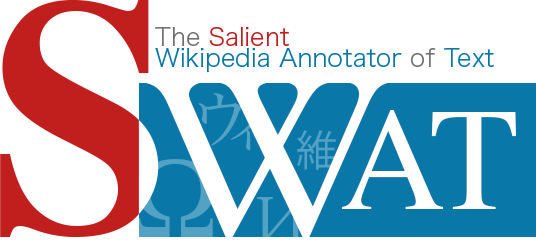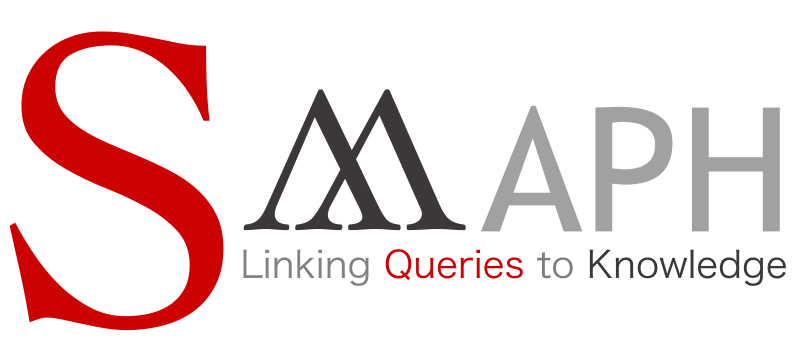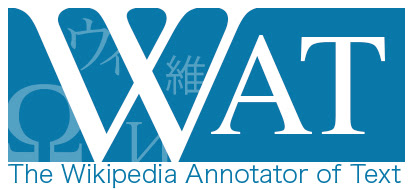Scientific coordinator: Paolo Ferragina
The classical bag-of-words paradimg relies its representation upon a merely set of words that compose an input text. Since this paradigm totally ignores the meaning of the words as well as the synonymy, polisemy and similarity between them, the performance of the resulting downstream applications can be drammatically penalized.
In order to overcome these limitations, A³ Lab developed a suite of algorithmic and artificial intelligence software tools for the efficient and efficacious semantic annotation (also referred in literature as entity linking) of natural language text with Wikipedia entities (pages). A number of results have shown that this annotation is extremely powerful: not only does it provide a deeper contextualization of the input text, but it also enable machines to effectively understand the natural language text as a small piece of the whole human knowledge.
Leonardo da Vinci and Mona Lisa). Transparent elements (e.g., Italy, Science, …) are the nodes of the underlying Knowledge Graph that can be use to infer information starting from the annotated entities.Another key of success of A³ Lab is the introduction of a new representation that enhances the bag-of-words representation with a new graph of entities (concepts) derived from the semantic annotation of the input text. Thanks to this representation, machines can now exploit the interconnnections present in the underlying Knowledge Graph in order to infer and enrich the input text with information that is not explicitely stated in its content.
The A³ Lab software suite is publicly available here and, since its official launch in 2015, it has already satisfied more than 3 millions of textual queries.
Software & Datasets






Selected Publications
-
Marco Ponza, Diego Ceccarelli, Paolo Ferragina, Edgar Meij, Sambhav Kothari. Contextualizing Trending Entities in News Stories. WSDM 2021
-
Marco Cornolti, Paolo Ferragina, Massimiliano Ciaramita, Stefan Rüd, Hinrich Schütze: SMAPH: A Piggyback Approach for Entity-Linking in Web Queries. ACM Trans. Inf. Syst. 37(1): 13:1-13:42 (2019)
-
Marco Ponza, Paolo Ferragina, Soumen Chakrabarti: A Two-Stage Framework for Computing Entity Relatedness in Wikipedia. CIKM 2017: 1867-1876
-
Ricardo Usbeck, Michael Röder, Axel-Cyrille Ngonga Ngomo, Ciro Baron, Andreas Both, Martin Brümmer, Diego Ceccarelli, Marco Cornolti, Didier Cherix, Bernd Eickmann, Paolo Ferragina, Christiane Lemke, Andrea Moro, Roberto Navigli, Francesco Piccinno, Giuseppe Rizzo, Harald Sack, René Speck, Raphaël Troncy, Jörg Waitelonis, Lars Wesemann: GERBIL: General Entity Annotator Benchmarking Framework. WWW 2015: 1133-1143
-
Francesco Piccinno, Paolo Ferragina: From TagME to WAT: a new entity annotator. ERD@SIGIR 2014: 55-62
-
Marco Cornolti, Paolo Ferragina, Massimiliano Ciaramita: A framework for benchmarking entity-annotation systems. WWW 2013: 249-260
-
Paolo Ferragina, Ugo Scaiella: Fast and Accurate Annotation of Short Texts with Wikipedia Pages. IEEE Software 29(1): 70-75 (2012)
-
Paolo Ferragina, Ugo Scaiella: TagMe: on-the-fly annotation of short text fragments (by Wikipedia entities). CIKM 2010: 1625-1628
-
Paolo Cifariello, Paolo Ferragina, Marco Ponza: WISER: A Semantic Approach for Expert Finding in Academia based on Entity Linking. Inf. Sys. (2019)
-
Paolo Ferragina, Francesco Piccinno, Roberto Santoro: On Analyzing Hashtags in Twitter. ICWSM 2015: 110-119
-
Ugo Scaiella, Paolo Ferragina, Andrea Marino, Massimiliano Ciaramita: Topical clustering of search results. WSDM 2012: 223-232
-
Daniele Vitale, Paolo Ferragina, Ugo Scaiella: Classification of Short Texts by Deploying Topical Annotations. ECIR 2012: 376-387
-
Paolo Ferragina, Giovanni Manzini: On compressing the textual web. WSDM 2010: 391-400
-
Paolo Ferragina, Antonio Gulli: A personalized search engine based on Web-snippet hierarchical clustering. Softw., Pract. Exper. 38(2): 189-225 (2008)

